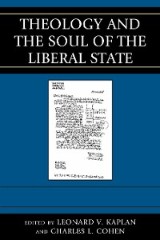Details

Theology and the Soul of the Liberal State
Graven Images
|
CHF 59.00 |
|
| Verlag: | Lexington Books |
| Format: | EPUB |
| Veröffentl.: | 21.12.2009 |
| ISBN/EAN: | 9780739144312 |
| Sprache: | englisch |
| Anzahl Seiten: | 438 |
DRM-geschütztes eBook, Sie benötigen z.B. Adobe Digital Editions und eine Adobe ID zum Lesen.
Beschreibungen
Rising calls in both the United States and abroad for theologizing national agendas have renewed examinations about whether liberal states can accommodate such programs without either endangering citizens' rights or trivializing religious concerns. Conventional wisdom suggests that theology is necessarily unfriendly to the liberal state, but neither philosophical analysis nor empirical argument has convincingly established that conclusion. Examining the problem from a variety of perspectives including law, philosophy, history, political theory, and religious studies, the essays in Theology and the Soul of the Liberal State suggest the possibilities for and limits on what theological reflection might contribute to liberal polities across the globe. Theology and the Soul of the Liberal State develops these issues under five headings. Part One explores 'The Nature of Religious Argument' as it can inflect discussions of public policy, political theory, jurisprudence, and education. Part Two, 'Theologies of the Marketplace,' notes that theology can by turns be highly critical, neutral, or even inordinately supportive of market operations. Part Three, 'European Perspectives,' reviews and develops arguments from Abraham Kuyper, Karl Barth, and French post-modernists concerning how one might integrate theological discourse into the public sphere. Part Four offers Israel, Pakistan and Tibet as 'Asian Perspectives' on how theology may comport with liberalism in recently created states (or, in the last case, a diasporic government-in-exile) where powerful religious constituencies make 'secular' civil action extremely problematic. Finally, Part V, 'Religion and Terror,' probes the vexed relationship between conceptions of divine and human justice, where the imperatives of theology and state confront each other most nakedly. Collectively, Theology and the Soul of the Liberal State suggests that the liberal state cannot keep theology out of public discourse and may even benefit from its intervention, but that their intersection, if potentially beneficial, is always fraught.
Conventional wisdom suggests that theology is necessarily unfriendly to the liberal state, but neither philosophical analysis nor empirical argument has convincingly established that conclusion. Examining the problem from a variety of perspectives, including law, philosophy, history, political theory, and religious studies, the essays in Theology and the Soul of the Liberal State suggest the possibilities for and limits on what theological reflection might contribute to liberal polities across the globe.
Part 1 Introduction
<br>Part 2 PART ONE - THE NATURE OF RELIGIOUS ARGUMENT
<br>Chapter 3 Chapter 1. Naked in the Public Square: Depth of Commitment in the Liberal State Today
<br>Chapter 4 Chapter 2. Social Contract in Modern Jewish Thought: A Theological Critique
<br>Chapter 5 Chapter 3. Justices Story and Holmes in the Realm of the "Brooding Omnipresence"
<br>Chapter 6 Chapter 4. Theology, Society and the Vocation of the University
<br>Part 7 PART TWO - THEOLOGIES OF THE MARKETPLACE
<br>Chapter 8 Chapter 5. St. Augustine, Markets, and the Liberal Polity
<br>Chapter 9 Chapter 6. When Markets and Gambling Converge
<br>Part 10 PART THREE - EUROPEAN PERSPECTIVES
<br>Chapter 11 Chapter 7. A Theological Case for the Liberal Democratic State
<br>Chapter 12 Chapter 8. Preserving the Natural: Karl Barth,
<i>The Barmen Declaration</i>: Article V, and Dietrick Bonhoeffer's
<i>Ethics</i>
<br>Chapter 13 Chapter 9. Materialism and Transcendence
<br>Part 14 PART FOUR - ASIAN PERSPECTIVES
<br>Chapter 15 Chapter 10. A Jewish and Democratic State: A Normative Perspective
<br>Chapter 16 Chapter 11. In the Shadows of Modernity? Theology and Sovereignty in South Asian Islam
<br>Chapter 17 Chapter 12. A Constitutional Analysis of the Secularization of the Tibetan Diaspora: the Role of the Dalai Lama
<br>Part 18 PART FIVE - RELIGION AND TERROR
<br>Chapter 19 Chapter 13. Grave Images: Terror and Justice
<br>Chapter 20 Chapter 14. Compassion, Knowledge and Power: A Tibetan Approach to Politics and Religion
<br>Part 2 PART ONE - THE NATURE OF RELIGIOUS ARGUMENT
<br>Chapter 3 Chapter 1. Naked in the Public Square: Depth of Commitment in the Liberal State Today
<br>Chapter 4 Chapter 2. Social Contract in Modern Jewish Thought: A Theological Critique
<br>Chapter 5 Chapter 3. Justices Story and Holmes in the Realm of the "Brooding Omnipresence"
<br>Chapter 6 Chapter 4. Theology, Society and the Vocation of the University
<br>Part 7 PART TWO - THEOLOGIES OF THE MARKETPLACE
<br>Chapter 8 Chapter 5. St. Augustine, Markets, and the Liberal Polity
<br>Chapter 9 Chapter 6. When Markets and Gambling Converge
<br>Part 10 PART THREE - EUROPEAN PERSPECTIVES
<br>Chapter 11 Chapter 7. A Theological Case for the Liberal Democratic State
<br>Chapter 12 Chapter 8. Preserving the Natural: Karl Barth,
<i>The Barmen Declaration</i>: Article V, and Dietrick Bonhoeffer's
<i>Ethics</i>
<br>Chapter 13 Chapter 9. Materialism and Transcendence
<br>Part 14 PART FOUR - ASIAN PERSPECTIVES
<br>Chapter 15 Chapter 10. A Jewish and Democratic State: A Normative Perspective
<br>Chapter 16 Chapter 11. In the Shadows of Modernity? Theology and Sovereignty in South Asian Islam
<br>Chapter 17 Chapter 12. A Constitutional Analysis of the Secularization of the Tibetan Diaspora: the Role of the Dalai Lama
<br>Part 18 PART FIVE - RELIGION AND TERROR
<br>Chapter 19 Chapter 13. Grave Images: Terror and Justice
<br>Chapter 20 Chapter 14. Compassion, Knowledge and Power: A Tibetan Approach to Politics and Religion
Leonard V. Kaplan is Mortimer M. Jackson Professor of Law at the University of Wisconsin Law School. Charles L. Cohen is professor of history and religious studies and director of the Lubar Institute for the Study of the Abrahamic Religions at University of Wisconsin-Madison.

















